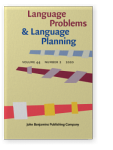Vol. 44:2 (2020) ► pp.200–241
Language skills and labour market returns
A meta-regression analysis
Increased migration, global trade and the introduction of digital labour platforms call for a better understanding of the mechanisms that can enhance economic and labour market outcomes in the face of increasing disparities in culture, language and identity. The article contributes to the literature on labour market returns on language skills, which is very heterogeneous and context-specific, by carrying out a systematic review of that literature. The meta-regression analysis estimates the returns on language skills that come from socio-economic, institutional and ethnolinguistic factors along with controls for the study design. The meta-regression results for the labour market returns that stem from knowledge of the local state language, a significant local minority language or the business language provide evidence that knowing the more influential language is associated with higher labour market rewards. Linguistic diversity has a negative effect on the returns to skills in the business language but increases the returns to the local state language. Urbanisation has a negative, though quantitatively modest, effect on returns to language skills in the business language, whilst the GDP level increases the returns to minority language skills and unemployment increases returns to skills in the business language and the local state language.
Article outline
- 1.Introduction
- 2.Literature on language skills and related earnings
- 3.Method
- 3.1Study design
- 3.2The meta-regression model
- 4.Results of the meta-regression analysis on returns to language skills
- 5.Discussion and concluding remarks
- Acknowledgements
- Notes
-
References
